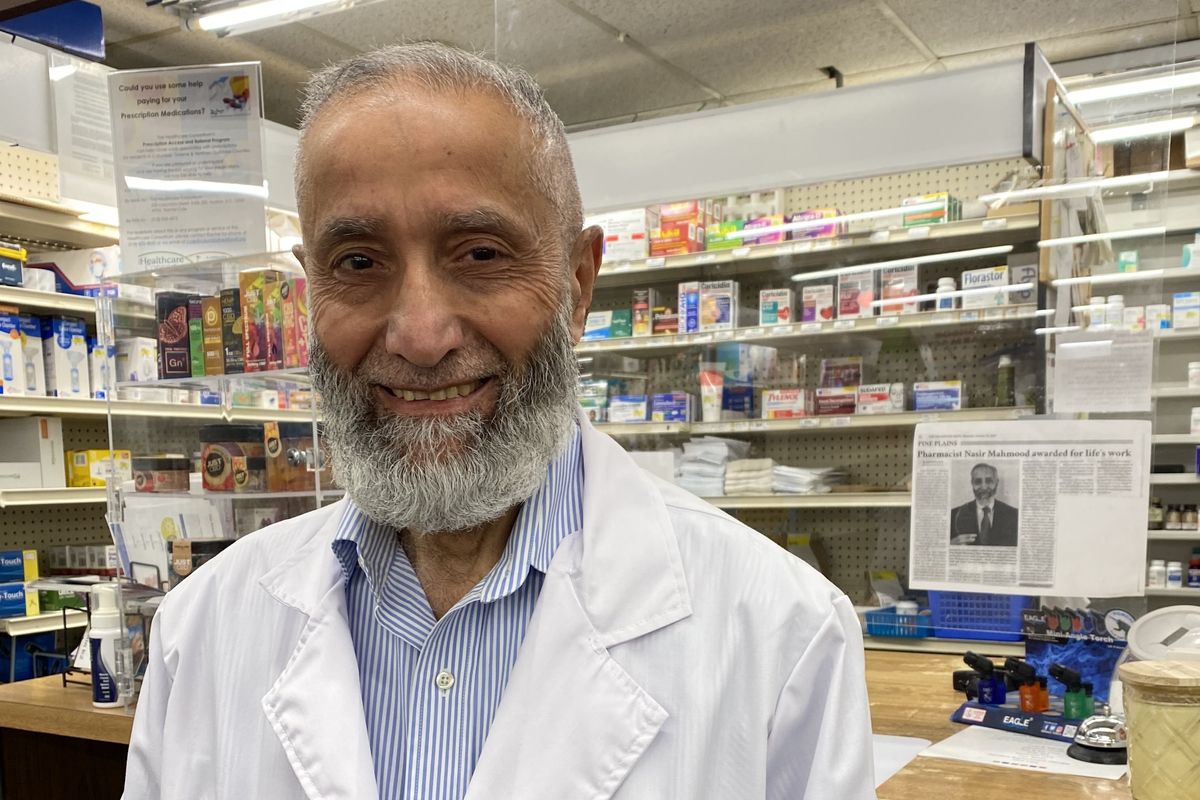Latest News
Pharmacist Nasir Mahmood, Pine Plains Pharmacy, is advocating for independent community pharmacies to allow them to continue serving their communities.
Leila Hawken
Local pharmacies are historically central to community life and have been for generations. If they offered a soda fountain counter with round swivel stools, so much the better.
Today’s family pharmacists throughout the area, however, are struggling under an oppressive pharmaceutical insurance middleman system that strips away profit from their prescription counter.
Beginning in the 1960s, Pharmacy Benefits Managers (PBMs) came upon the scene to process drug claims for insurance companies. By the 1970s they were serving as middlemen between manufacturers, insurance companies and pharmacies, adjudicating prices.
Today, PBMs not only adjudicate claims, but now they develop and manage pharmacy networks, determine the list of drugs to be covered by insurance, set co-pay amounts and serve to channel the patient to a particular choice of pharmacy.
According to the Pharmacists Society of the State of New York (PSSNY), PBMs can own their own pharmacies, retail and mail order, and profit from sales and services. The work of the PSSNY is to propagate and protect community pharmacies.
The effect of this progression as PBMs have become “invisible middlemen” has been devastating to local family-owned pharmacies in area towns in New York and Connecticut, endangering their existence and the invaluable service they provide to their patients and the communities they serve.
Today, the three largest PBMs control nearly 80% of the prescription benefits market share in the U.S., according to the PSSNY.
“We are so lucky to have this pharmacy. It’s a blessing,” said Pine Plains resident Ann Noone, a regular customer of the Pine Plains Pharmacy, commenting on Monday, April 8 about the local business and its pharmacist. “He’s done a lot for this town.”
Pharmacist at the Pine Plains Pharmacy since 1989, and owner of the historic corner drug store since 2006, Nasir Mahmood has witnessed the financial squeeze on area pharmacies with some forced to close their doors, victims of the PBM system.
It is the PBMs that pre-determine how much each drug covered under the plan should cost, and this is the amount it reimburses all pharmacies except the large-chain ones they own. Often the reimbursement rates are well below the cost of the drug, putting pharmacies in the position of having to fill a prescription at a loss.
“We cannot wait for PBM reform,” said Mahmood on Wednesday, March 27, describing the current tenuous status of bi-partisan federal legislation awaiting vote in Washington, D.C.
Having served as president of the PSSNY for two years in 2008-09 and having finished a two-year term as chairman of the PSSNY Board in March, Mahmood now continues as a member of that board. He also serves on the National Legislative Committee within the National Community Pharmacists Association (NCPA) working with other pharmacists’ professional organizations promoting new legislation to place limits on PBMs and create an equitable structure of reform and accountability.
Bipartisan bills have passed out of committee and are awaiting floor vote that would provide strict regulation and transparency to the work of the PBMs, improve patient access and lower costs, Mahmood said. The NCPA has achieved some recent success in the long process of bringing bills to the floor for a vote.
A series of Senate and House bills received bipartisan support and convincing vote margins as they emerged from committees. With passage, the various pieces of legislation would bring lower drug costs, greater transparency in the process, require the Centers for Medicare and Medicaid Services (CMS) to define their contract terms, and require PBMs to operate with greater transparency.
The legislation was attached to the government funding package that was passed in late March to avoid a government shutdown, but Mahmood said that at the last minute the PBM bills were stripped out of the package.
Continuing their commitment to PBM reform, however, Senate Finance Committee Chairman Ron Wyden (D-OR) and Ranking Member Mike Crapo (R-ID) pledged to press on with efforts to enact the legislation before the end of this congressional year.
The NCPA further reported that on Friday, March 22, a bipartisan group of 21 senators and 51 house representatives signed a letter to their respective leadership, asking for immediate action on PBM reform measures.
Advocacy groups are actively pursuing passage of the legislation having arranged a conference drawing pharmacists from across the U.S. to the national headquarters of the NCPA in Alexandria, Virginia, for a two-day meeting to begin on Wednesday, April 17.
“We’ve come a long way with continued advocacy year after year,” Mahmood said, contemplating his participation in the upcoming meeting. Senators and representatives will be reporting to the conference and encouraging continued advocacy strategies to promote passage of the bipartisan PBM legislation.
One bill would bring transparency to Medicaid drug pricing with annual savings of $1 billion. Another would remove PBMs from negotiating CMS services, and the third would provide for greater transparency, oversight and enforcement through the Federal Trade Commission (FTC).
Independent pharmacies throughout the area have expressed their concern about the issue and joined in the hope that the current efforts toward passing legislation will be successful.
Meanwhile, local and area pharmacists remain in the balance, squeezed by the PBM system and locked out of the price negotiation process. During an interview, Mahmood noted that there is not one independent community pharmacy left open in Columbia County.
“It’s not fair,” he said.
Keep ReadingShow less
Slope being cleared of trees at the junction of Route 44 and Old Colony Road in Norfolk as part of CT DOT Project 97-95
Jennifer Almquist
NORFOLK — For the next five years, travel on Route 44 will be reduced to one lane in Norfolk, also known as Greenwoods Road West, for the Connecticut Department of Transportation (DOT) to replace existing retaining walls and stabilize the slope along the north side of the road for the safety of the highway.
Last week, DOT Project 97-95, as the extensive undertaking is called, was green lit to begin. Over time the stone retaining walls along the roadway have bulged from the pressure exerted by the angle of the slope and years of heavy rains. In 2010 a mudslide occurred in the affected section of highway which extends from just west of Memorial Green to east of Old Colony Road. In 2019 DOT installed temporary concrete bin blocks, or Mafia barriers (so-called because cement production of them used to be controlled by the mob), along the base of the existing walls due to their movement.
Amy Hare, head engineer for Project 97-95, emphasized the level of preliminary work necessary. Already one family has had to relocate, and their hillside home was just razed. Currently, the town’s water company, Aquarion, is analyzing and relocation of underground water pipes from that section of highway.
Next, Eversource will remove and reconfigure all affected utility poles. Many trees need to be cleared on the slope and on Old Colony Road. The entire site was surveyed. To stabilize the slope during excavation, timber lagging (involves wiring series of wooden slats together to form a blanket) followed by soil anchors will be driven into the hillside to create a supporting wall. Mechanically stabilized earth (MSE) held by metal straps will also be used. Stones removed from the old walls will be available for use by the Town of Norfolk.
The Renkert family, who lost their home, said that they were approached 10 years ago by the state about the need for this construction project. They were sad to leave Norfolk after having raised their children in that home for 19 years and having put considerable work into its renovation.
Mrs. Renkert noted that “the guys from the state were compassionate — really terrific — businesslike, responsive and professional.” The Renkerts say that they were fairly compensated by the state and are comfortable in their new home.
While many adjacent areas will be affected by the construction, DOT is exercising caution to avoid disrupting the cemetery on Old Colony Road. Established in 1757, Norfolk’s historic Center Cemetery is located on the ridge above the unstable slope. Care has been taken to ensure that the integrity of the sacred space will not be violated. Working closely with cemetery officials, project planners established strict protocols to protect the graves and historic markers. Work vehicles entering the cemetery must fit between the two stone gate markers. Radar will be used to establish gravesites. Vulnerable areas will be clearly marked, and a temporary alternate access road will be built. All work will stop when there is a funeral. During the construction process, the public will continue to have access to all burial areas.
Traffic flow on Route 44 is already feeling the impact of the work. One lane will always be kept open wide enough for trucks to pass. An alternate 45-minute detour truck route was devised to move traffic south on 272 (near the Norfolk Library), to Route 4 to Goshen, to Route 63, then looping back up Route 7 to Canaan. Large interstate truckers can either use the suggested detour or go north to use the Mass Pike. For the smaller, local trucking companies the impact will be more severe. Delays that cut down the number of daily runs they can drive will affect their bottom line, according to the folks at George’s Garage in Norfolk. It is too early to fully predict the degree to which travel will be affected. Temporary illumination will be in place for night traffic.
When Project 97-95 is complete, the map area designated as Site #1 will have a retaining wall 1,030-feet-long, 30 to 42-feet-tall, with decorative fencing along the top. Site #2 will have a retaining wall approximately 490 feet long and will be 6-19 feet tall. The current steep slope of 1:1 (45 degrees) will be reduced to 2:1 (27 degrees). The multiple drainage systems along Route 44 that discharge directly into Blackberry River will be reconstructed and consolidated.
The improved highway will have 12-foot-wide lanes. Carving back the banks for the walls will create a wider roadway. Existing narrow shoulders will be widened to five feet allowing for a safer bicycle route. Route 44 is part of the statewide bicycling network.
The retaining walls will be made of segmented pre-cast concrete panels with an architectural “natural stone” finish to be selected by the town of Norfolk. Turf replacement using conservation grass seeds, and small plantings (to retain sightlines) will be established, following environmental and native-species guidelines.
The estimated cost of Project 97-95 is $24 million, with 80% coming from federal funds, and 20% from state funds. While Norfolk will not have to pay directly for the project, the indirect cost and inconvenience will be significant.
Norfolk First Selectman Matt Riiska acknowledged both the cost and the need, “This project has been discussed for a long time. The amount of planning and coordination has been the Department of Transportation’s focus for many years. We have neglected our infrastructure for far too long. Unfortunately, it is going to be another disruptive project for the residents in Norfolk, but these things must be done.”
Salvatore Aresco is the Project Manager for CT DOT Project 97-95.
Keep ReadingShow less
Rachel Roth
Kristen Jenson
NORFOLK — Manor House Inn has been awarded a Connecticut Green Lodging Certification, and will re-open just in time for Earth Day.
When Rachel Roth and her husband bought the 125+ year-old inn in February 2022, the property was in need of considerable repairs They spent the first seven months balancing accommodating guests and updating the property. Roth’s son worked hard restoring much of the interior space, patching walls, painting, and serving as property manager.
Roth’s initial vision was to develop the property as a wedding venue, but resistance was met by neighbors who were concerned about how that business model would impact Norfolk’s quiet ambiance.
“We received candid feedback from neighbors who expressed concern about the level of activity and traffic. Although I believe we could have executed a venue well with minimal disruption to the neighborhood, I want to build a business that is welcomed by the community,” Roth said.
Other unforeseen events challenged her business. On Nov. 5, 2022, the biggest gas spill in Connecticut history happened right outside. A truck capsized on Route 44, spilling 8,200 gallons of gasoline into the earth and storm sewers, some of which converged on Roth’s property.
Guests were evacuated, power was turned off and no one could tell when it would be safe to reopen. They were forced to close indefinitely with heavy excavation and drilling expected for months.
“Since purchasing the property in Feb of 2022, we’ve been closed for more months than we’ve been open,” said Roth.
Manor House reopened primarily on weekends, ensuring guests were aware of the situation. Roth closed again this past winter to address fire code updates. With Maple Avenue torn up in front of their property for environmental remediation, it has been a challenging journey for Roth that has forced her to rethink her initial vision.
“We purchased the Manor House with the desire to restore it to a condition worthy of its history while building a business that contributes to the local economy and community life,” said Roth.
She explained that before buying the inn, her initial business plan was based on the goals outlined in Norfolk’s 2019 Plan for Conservation & Economic Development; specifically, to bring more young people into town by offering a wedding venue.
She aimed to support economic development (e.g. an upscale hospitality property brings guests who spend money in local shops and restaurants), and to maintain and enhance community assets (e.g. the Manor House is an architectural treasure; one that needs to be financially viable to be well-maintained).
“Ultimately, I believe that vibrant businesses increase property values, reduce the tax burden on property owners, draw young people and visitors into town, and improve the overall quality of communal life,” Roth said.
Now, Manor House has rebranded itself as an eco-friendly luxury boutique hotel with a commitment to sustainable hospitality practices. It has been awarded the Connecticut Green Lodging Certification by the Department of Energy and Environmental Protection (DEEP CT) and the Connecticut Office of Tourism, which offers a certification program for hotels called “Connecticut Green Lodging — Accommodating You and Our Environment.”
“Regarding the Green Lodging Certification, it is a self-certification program set up by DEEP CT and based on accumulating points associated with environmental practices. After researching all the eco-friendly updates we could consider, we made as many changes as possible and submitted our application for state review,” said Roth.
Her new management company, Ray Hospitality Inc., prioritizes environmental stewardship efforts with green initiatives including energy-efficient technologies, eco-friendly amenities, green cleaning products, water conservation measures, waste reduction programs, and locally sourced seasonal culinary offerings that appeal to eco-conscious travelers.
“As stewards of this historic property, we are driven to preserve its timeless charm while embracing sustainable practices that minimize our environmental impact,” she said.
Energy-efficient LED lighting, low-flow water fixtures, and optional linen/room refreshes allow visitors to indulge in premium amenities while conserving precious resources. The inn has also embraced a “reduce, reuse, recycle and upcycle” culture, minimizing single-use plastics and repurposing materials wherever possible.
Sustainably sourced foods complement the eco-friendly accommodations. Guest chefs and food educators are welcomed onsite to offer specialized cooking classes, including an upcoming class on May 11 with Terry Walters from Clean Food, whose focus is on crafting nourishing, seasonal, plant-centric recipes.
“Our development plans will encourage nature-immersive experiences in the Northwest Corner to support wellbeing. It’s truly an enchanting place that I’m passionate about sharing.
Manor House Inn plans to open April 18.
For more information, see the website: www.manorhouse-norfolk.com
Keep ReadingShow less
FALLS VILLAGE — Eason Zhang and Kara Franks are this year’s winners of the Superintendent’s Award from Housatonic Valley Regional High School.
Kara is the President of the Housatonic Valley FFA chapter, and an officer in the high school’s National Honor Society chapter. She plans to attend college for a nursing degree in the fall and works as a host at the Bulls Bridge Inn in Kent on weekends. In her spare time, she likes to work with horses.
Eason told The Lakeville Journal he is the first in his family to finish high school, much less go to college. He will attend Brown University in the fall.
Eason is captain of the varsity cross-country and track squads. He works in his family’s business, the Shanghai Restaurant in Kent. He said he is interested in “environmentally sustainable entrepreneurship” and plans to study computer science. He also tutors younger children in math at Kent Center School and area private schools.
Click here to see more winners.
Keep ReadingShow less
loading















